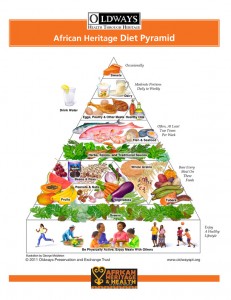The African Heritage Diet Pyramid
By Ahmed A. Salifou

A U.S. non-profit organization specialized in the promotion of healthy eating based on regional diet pyramids recently published a nutritional guide for African Americans. Oldways, the nutritional nonprofit organization that has created the famous Mediterranean Diet Pyramid, has released yet another “diet pyramid” intended for a specific population: individuals of African descent. With contributions from historians and nutritionists, Oldways has created the African Heritage Diet Pyramid – a nutritional guide designed to provide healthy nutritional alternatives to an African American population that has been plagued with diet-related illnesses. “We worked with culinary historians to put this pyramid together, drawing on foods that are central to traditions such as greens, yams, homemade marinades, seafood, and, to a lesser extent, poultry, dairy, and meats,” stated Sara Baer-Sinnott, president of Oldways. The African Heritage Diet Pyramid is the latest nutritional guide to originate from the Boston-based nonprofit.
The African Heritage Diet Pyramid is comprised of a variety of foods of African, American, Caribbean and South American derivation. Its structure is very similar to that of the Mediterranean Diet Pyramid—foods that are situated near or at the top are advised to be consumed sparingly whereas foods that are located near or at the bottom are recommended for abundant consumption.
Sweets are situated at the pyramid’s acme, suggesting a minimal intake of foods laden with sugar. Underneath the sweets category, one would find dairy products, where foods such as milk and yogurt are not recommended in large servings. Looking down below, one would find meats (ex. poultry, eggs and healthy oils such as sesame oil, olive oil) sharing the same level. Seafood, located further down the pyramid, is advised to be eaten at least twice a week. On the next level below, one would find herbs, traditional sauces and spices. Foods such as fruits, nuts, grains and vegetables follow and at the very bottom of the pyramid lies what Oldways considers to be the healthiest food group: greens (ex. collards, spinach, lettuce, etc.).
Flavor and taste are two traditional key components of the foods of African heritage known for blending bunches of herbs, spices and succulent sauces with fresh vegetables to craft simple, yet healthy, meals.
Some individuals have expressed concern over the African Heritage Diet Pyramid’s disregard for certain fried foods that have become part of the traditional African American diet. “Crisco isn’t exactly ancient,” stated Baer-Sinnott in response to such concerns. “We emphasized preparing foods in a healthier way,” she concluded.
Although the African Heritage Diet Pyramid is primarily designed to convey healthy nutritional information, it also serves as a guide for overall better living by encouraging physical activity. It stresses the virtues of communal and family life, the benefits of simple joys such as music to nourish one’s mind, not to mention the need for a good night sleep to recharge one’s body.
The Diet Pyramid has been well received by African Americans living in the Boston area. No information is available so far about reactions elsewhere.
Vivien Morris, a co-developer of the African Heritage Diet Pyramid, has expressed optimism about the nation’s anticipated response to Oldways’ latest creation. “I think a lot of people are eager to get back to their common roots,” she stated.
Oldways has been on a rigorous campaign to promote the African Heritage Diet Pyramid. In early February – Black History Month in the United States – the multinational retailer Wal-Mart gave Oldways $100,000 as a way of aiding the nonprofit in its promotional efforts.
About Oldways
Oldways, a Boston-based nonprofit organization, is dedicated to “changing the way people eat through practical and positive programs grounded in science, traditions, and delicious foods and drinks,” in the words of the organization’s officials. It was founded in 1990 by K. Dun Gifford, a Harvard graduate who passed away in May 2010 after serving as its president for two decades. Gifford, who served as national chair of the American Institute of Wine & Food, owned and managed a number of restaurants in Boston and Cambridge, and founded a food business (Kilvert & Forbes) with John F. Kerry, later a U.S. Senator. With his business partner at Oldways, Sara Baer-Sinnott, Gifford was co-author of The Oldways Table, described by one reviewer as a “comprehensible and extensive food reference packed with alluring recipes, helpful instructions, nutritional information and exceptionally amusing stories and essays about food and life.”


